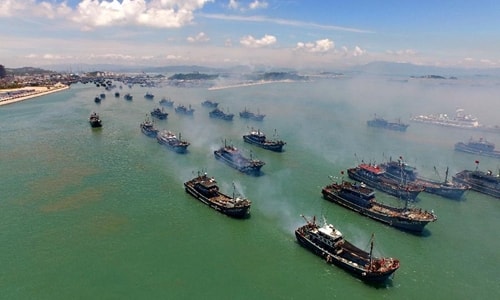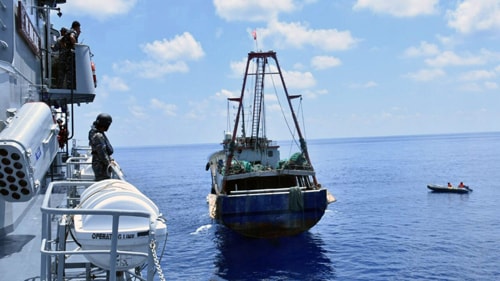Chinese fishing boats destroy the East Sea
If tens of thousands of Chinese fishing vessels continue to operate at the current scale and destructive fishing methods, the East Sea will be depleted in the near future.
 |
| Chinese fishing boats prepare to head out to the East Sea from Fujian province, southeastern China, August 2015. Photo: Xinhua. |
China National Radio reported that the country's Ministry of Agriculture has asked coastal localities, including Hainan province bordering the East Sea, to cut or not increase the number of fishing vessels in operation to "protect marine resources", in the context of the seas around China becoming depleted, according to SCMP.
Observers say China's move shows that seafood resources are becoming a major concern for Beijing in the East Sea, and that Chinese authorities are also worried about the destruction their fishing fleet is causing to seafood.
Disaster is imminent
According to Australian newspaper The Conversation, quoting fisheries experts, despite its relatively small area of only about 3 million square kilometers, the East Sea is an area with abundant seafood reserves, home to at least 3,365 fish species, accounting for 12% of the world's catch, bringing in a value of up to 21.8 billion USD.
These seafood species are considered to be more valuable than oil and gas, because they play an important role in food security and livelihoods of hundreds of millions of coastal fishermen, providing regular jobs for nearly 4 million workers in the region.
A report published last year by Dr. Rashid Sumaila and Dr. William Cheung of the University of British Columbia, Canada, showed that up to 55% of the world's fishing vessels are operating in the East Sea, of which the fishing fleets of mainland China and Taiwan account for the majority.
The fishing fleet of Hainan province, China currently has tens of thousands of vessels, many of which are large steel-hulled vessels that can fish far from shore for long periods of time, to meet the growing demand for domestic seafood. The World Bank estimates that China consumes more than one-third of the world's seafood, and that the country's demand will increase by 30% by 2030.
Chinese fishermen use destructive fishing methods such as using explosives and poison on coral reefs to catch fish, combined with their illegal reclamation and artificial island building activities in the East Sea, which have destroyed coral reefs on a large scale.
The destruction of coral reefs has led to the loss of fish spawning grounds and their young losing their places to hide. As a result, many coastal waters in China are now fish-free, while the average hourly catch of fish in the South China Sea has dropped by a third in the past 30 years.
According to Dr. Sumaila's estimates, if Chinese fishermen continue to maintain the current scale and form of fishing, fish stocks in the East Sea could decline by up to 59% by 2045, causing a disaster for the future of fishing in this sea area.
Ambition
 |
An Indonesian warship detained a Chinese fishing boat for illegally fishing in the exclusive economic zone. Photo: Reuters |
While China’s Ministry of Agriculture has asked other localities to cut the number of fishing vessels by 3%, it has only asked Hainan’s fisheries department not to increase the number of fishing vessels in the province. Analysts say this shows Beijing’s determination to expand its fishing areas in the South China Sea to serve its territorial ambitions.
With coastal waters depleted of fish stocks, China is seeking to push its Hainan-based fishing fleet deeper into the South China Sea, by building large fishing ports and providing financial support for fishermen to build larger, more powerful vessels that can operate for longer periods. Chinese fishing vessels have now increasingly intruded into waters near neighboring countries, despite the arbitral tribunal ruling that rejected Beijing’s historic rights in the South China Sea.
At sea, the Chinese coast guard is ready to supply fuel to fishing boats, and even intervene when Chinese fishing boats are chased and arrested by law enforcement agencies of other countries for illegal fishing in their exclusive economic zones.
According to analysts at The Conversation, Chinese fishing vessels are not only used for fishing, but also an important force for Beijing to consolidate its illegal sovereignty claims in the East Sea. They are equipped and trained to become "maritime militia", ready to pursue and oppress fishing vessels from other countries, and even fight against law enforcement forces at sea.
However, it seems that Chinese officials themselves are beginning to worry about the destruction that this fishing fleet they support is causing to marine resources in the South China Sea. Han Changfu, China's agriculture minister, said that the country's fishing activities at sea must be placed under "strict supervision, regulation and discipline" and "gradually eliminate environmentally destructive production methods".
Professor Cai Shengli, a marine biologist at Shanghai Ocean University, said that cutting the number of Chinese fishing vessels is not enough to protect marine resources, especially when Beijing still insists on realizing its sovereignty ambitions by continuing to support and encourage fishermen to replace small boats with larger means to go into the East Sea on a "scary" scale.
According to Dr. Sumaila, if China continues its destructive ways, the fishing industry in the South China Sea will face the risk of collapse, causing serious consequences for China itself and the countries in the region. Ultimately, "the fishermen and the fish will be the losers" if Beijing continues this policy, Sumaila emphasized.
According to Tri Dung/VNE

